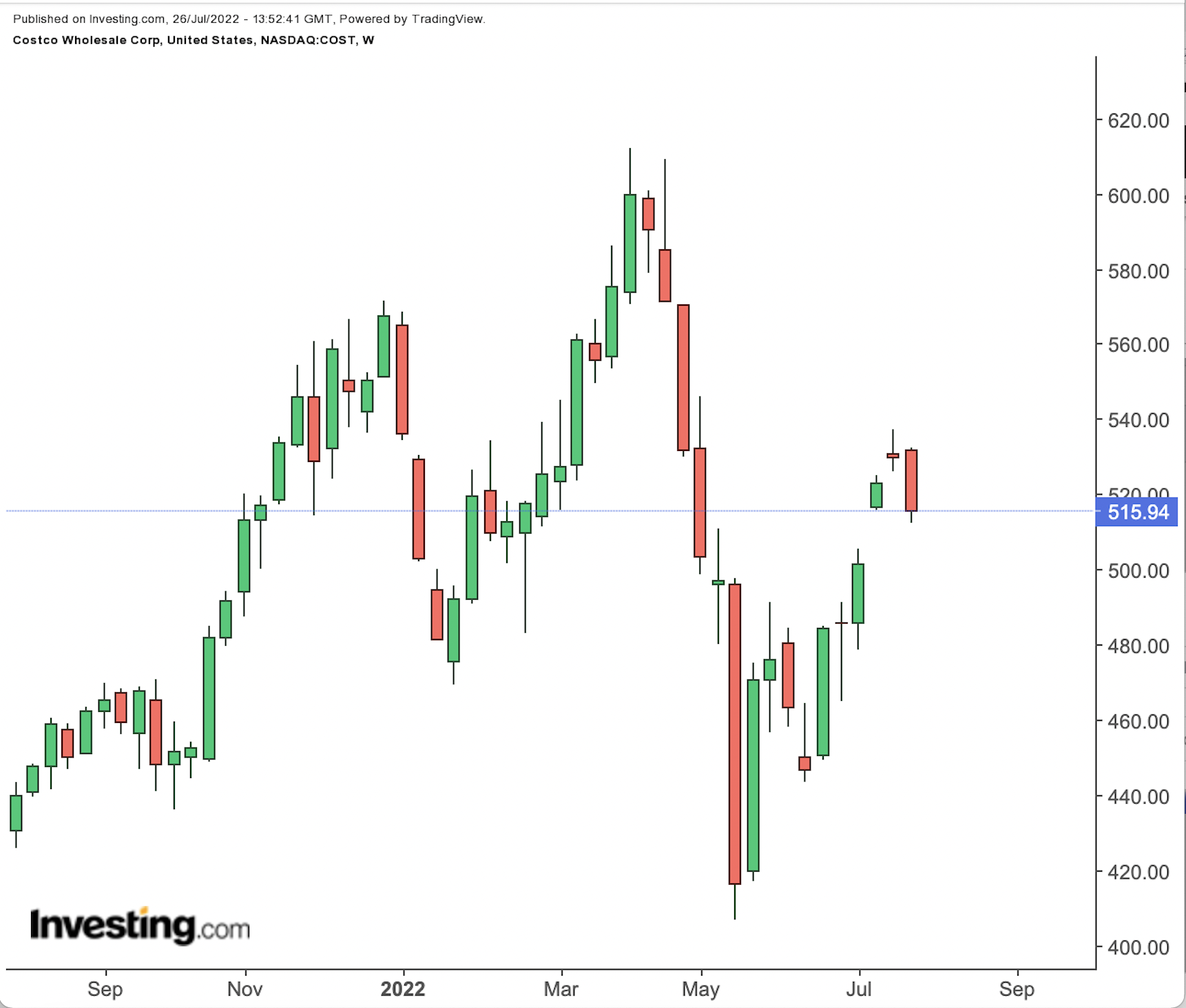Oklo stock tumbles as Financial Times scrutinizes valuation
- Costco is an impressive business, but a massive multiple to FY22 earnings raises valuation concerns
- COST may be seen as protected from inflation and recession — but that’s not necessarily the case
- All told, Costco stock might be more dangerous than investors perceive
In fiscal 2017, Costco Wholesale (NASDAQ:COST) generated $5.82 per diluted share in net profit, excluding one-time items. For fiscal 2022 (Costco fiscal years end on the Sunday closest to the end of August), Wall Street expects the company to earn about $13 per share.

Source: Investing.com
Over five years, then, Costco should increase earnings per share in the range of 125%, or about 17% annualized. That kind of growth would seem to make COST stock an attractive pick.
But there’s a potential catch. Over the preceding five years before Monday’s close, COST stock had provided total returns of 277% — more than twice its earnings growth over roughly the same stretch. In July 2017, COST traded at about 26x that fiscal year’s earnings. If Wall Street consensus for FY22 is in the range of correct, COST now trades at 40x.
It’s a massive multiple — and a surprising one in a market that, measured by the S&P 500, is down 17% year-to-date. That’s doubly true given the pressure on so many retailers of late. No less than Walmart (NYSE:WMT) was the latest domino to fall, with its stock plunging 10% in after-hours trading Monday following a slashed profit forecast. Even before that news, WMT traded at about 20x this year’s estimated earnings — a multiple half that of Costco.
To be sure, there’s no doubt that Costco is a great business. Given that valuation, however, the question is whether Costco stock is a great stock.
Is The Business Good Enough?
There’s certainly an argument that COST merits a premium to the rest of the market. Yes, other retailers beyond Walmart are struggling: Target (NYSE:TGT) cut its second-quarter forecast twice in three weeks, and smaller specialty players have seen their stocks plunge.
But Costco is not just a better retailer, but a different one entirely. Its earnings aren’t necessarily sensitive to fluctuations in product demand or even pricing. Rather, the bulk of Costco profit comes from membership fees.
Year-to-date, membership fees were $2.9 billion — and Costco’s operating profit came in at $5.3 billion. Last year, membership fees accounted for 58% of operating profit.
Traditional retailers are at the mercy of the macroeconomic environment. Profit margins are relatively thin, and fixed costs are rather high. If sales rise 10%, earnings often can double or more; if they fall 10%, a profitable business can fall into the red.
Costco doesn’t have that problem. As long as membership levels hold up, the company is going to stay relatively profitable. And the value proposition Costco has offered for 46 years means that membership levels almost certainly are going to hold up.
In the software space, investors have proven a willingness to pay up for recurring revenue. Valuations there have come down so far this year, but remain elevated relative to the rest of the market.
Costco isn’t a software company, obviously, and it’s a bit of a stretch to compare it to a mission-critical software-as-a-service (SaaS) provider.
But it’s not that big of a stretch. At the very least, Costco stock can’t be compared to other retailers, or even the average large-cap issue.
Will Costco Thrive While Others Falter?
Bulls would cite another reason to consider COST stock here: it may be particularly well-positioned to weather what looks like a difficult environment going forward.
High inflation only adds to the valve provided by Costco’s low prices and bulk sizes, let alone its dirt-cheap gasoline prices. And if that inflation is accompanied by a recession, as many investors fear, the non-discretionary nature of most Costco sales should keep results at worst stable.
That’s the bull case, anyway. But here is where the bull case at the moment starts to falter. It’s worth going back to fiscal 2009, during the worst of the financial crisis. That year, Costco’s consolidated revenue actually declined 1.5%. Membership fees rose just 2%; operating profit fell 10%.
To be sure, results that year did not occur in an inflationary environment. And Costco is a bigger, and better, business than it was then. Still, the knee-jerk assumption that Costco profits will grow no matter what might be overly optimistic.
Consumers still need to spend something for Costco profits to grow. Product sales now drive a much larger share of operating profit: 42% in FY21 against 24% in fiscal 2008. And of those product sales, in FY21 29% came from so-called “non-goods," which include electronics, hardware and apparel, among many other categories. Those revenues increased a sizzling 36% between FY19 and FY21, and another 10% through the first three quarters of FY22.
Those types of categories are exactly where so many other retailers are struggling. It does seem too optimistic to believe that Costco alone will avoid those pressures. Inflation is a concern, but spending in areas like travel and dining remains robust. One major issue for retailers is that consumers simply seem to have too much stuff. Costco, as great a business as it is, sells an awful lot of stuff — not all of which is essential.
Be Careful Out There
It does seem like it will be difficult for Costco to hold a 40x price-to-earnings multiple, particularly if the market turns south again. Costco is protected against inflation and recession — but it’s not impervious to either.
Few investors at the start of the year would have predicted that Walmart — an impressive and recession-resistant business in its own right — would be predicting a double-digit decline in second-quarter earnings. The news may not get quite that bad for Costco — but at 40x earnings, it doesn’t have to. Bulls might think the stock is ‘safe’, but no stock with this kind of valuation truly is.
Disclaimer: As of this writing, Vince Martin has no positions in any securities mentioned.
